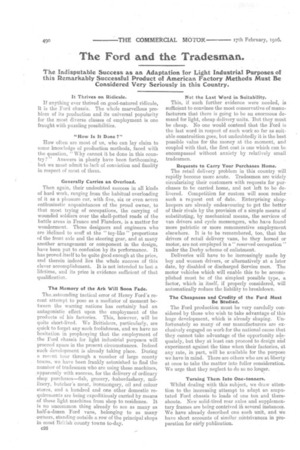The Ford and the Tradesman.
Page 4

If you've noticed an error in this article please click here to report it so we can fix it.
The Indisputable Success as an Adaptation for Light Industrial Purposes of this Remarkably Successful Product of American Factory Methods Must Be Considered Very Seriously in this Country.
It Thrives on Ridicule.
If anything ever thrived on good-natured ridicule, it is the Ford chassis. The whole marvellous problem of its production and its universal popularity for the most diverse classes of employment is one fraught with puzzling possibilities.
"How Is It Done ?"
How often are most of us, who can lay claim to some knowledge of production methods, faced with the question, " Why cannot it be done in this country ? " Answers in plenty have been forthcoming, but we must admit to lack of conviction and finality in respect of most of them.
Generally Carries an Overload.
Then again, their undoubted success in all kinds of hard work, ranging from the habitual overloading of it as a pleasure car, with five, six or even seven enthusiastic acquaintances of the . proud owner, . to that most trying of occupations, the carrying of wounded soldiers over the shell-potted roads of the battle areas in France and Flanders, is a matter for wonderment. Those designers and engineers who are inclined to scoff at the " toy-like" proportions of the front axle and the steering gear, and at many another arrangement or component in the design, have been put to confusion by its performance. It has proved-itself to be quite good enough at the price, and therein indeed lies the whole success of this clever accomplishment. It is not intended to last a lifetime, and its price is evidence sufficient of that qualification.
The Memory of the Ark Will Soon Fade.
The..astounding tactical error of Henry Ford's recent attempt to pose as a mediator of moment between the warring nations has certainly had an antagonistic effect upon the employment of the products of his factories. This, however, will be quite short-lived. We Britishers, particularly, are quick to forget any such foolishness, and we have no hesitation in prophesying that the employment of the Ford chassis for light industrial purposes will proceed apace in the present circumstances. Indeed • such development is already taking place. During a recent tour through a 'number of large county towns, we have been frankly astonished to find the number of tradesmen who are using these machines, apparently with success, for the delivery of ordinary shop purchases—fish, grocery, thaberdaShery, millinery, butcher's meat, ironmongery, oil and colour stores, and a hundred and one other domestic requirements are being expeditiously carried by means of these light machines from shop to residence. It is no uncommon thing already to see as many as half-a-dozen Ford vans, belonging to as many owners,. standing outside a row of the principal shops in most 13titi'sh aunty towns to-day.
026 Not the Last Word in Suitability.
This, if such further evidence were needed, is sufficient to convince the most conservative of manufacturers that there is going to be an enormous demand for light, cheap delivery units. But they must be cheap. No one would contend that the Ford is the last word in respect of such work so far as suitable constrnation goes, but undoubtedly it is the best possible value for the money at the moment, and coupled with that, the first cost is one which can be encompassed without anxiety by relatively small tradesmen.
Requests to Carry Your Purchases Home.
The retail delivery problem in this country will rapidly become more acute. Tradesmen are widely circularizing their customers with requests for purchases to be carried home, and not left to be delivered. Competition for custom will soon render such a request out of date. Enterprising shopkeepers are already endeavouring to get the better of their rivals by the provision of a simple means of substituting, by mechanical means, the services of van drivers and cycle messengers, who have found more patriotic or more remunerative employment elsewhere. It is to be remembered, too, that the drivers of retail delivery vans, be they horsed or motor, are not employed in a " reserved occupation" under the Derby scheme of enlistment.
Deliveries will have to be increasingly made by boy and women drivers, or alternatively at a later date, by disabled or discharged Service men. The motor vehicles which will enable this to be accomplished must be of the simplest possible type, a factor, which in itself, if properly considered, will automatically reduce the liability to breakdown.
The Cheapness and Crudity of the Ford Must Be Studied.
The Ford production must be very carefully considered by those who wish to take advantage of this huge development, which is already shaping. Unfortunately so many of our manufacturers are exclusively engaged on work for the national cause that they cannot take advantage of the opportunity adequately, but they at least can proceed to design and experiment against the time when their factories, at any rate, in part, will be available for the purpose we have in mind. There are others who are at liberty at once to take the matter into fuller consideration. We urge that they neglect to do so no longer.
Turning Them Into One-tonners.
Whilst dealing with this subject, we draw attention to the increasing attempt to adapt an amputated Ford chassis to loads of one ton and thereabouts. New solid-tired rear axles and supplementary frames are being contrived in several instances. We have already described one such unit, and we have short accounts of similar contrivances in preparation for early publication.




















